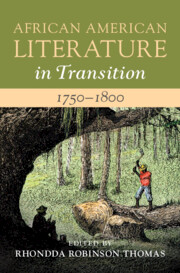Book contents
- African American Literature in Transition, 1750–1800
- African American Literature in Transition
- African American Literature in Transition, 1750–1800
- Copyright page
- Contents
- Contributors
- Preface
- Chronology
- Introduction
- Part I Limits and Liberties of Early Black Print Culture
- Part II Black Writing and Revolution
- Part III Early African American Life in Literature
- Chapter 7 Reading and Building a Nation; or, Everyday Living (while Black) in Early America
- Chapter 8 Respectability Politics and Early African American Literature
- Chapter 9 Early Black Futures
- Part IV Evolutions of Early Black Literature
- Index
Chapter 9 - Early Black Futures
from Part III - Early African American Life in Literature
Published online by Cambridge University Press: 01 April 2022
- African American Literature in Transition, 1750–1800
- African American Literature in Transition
- African American Literature in Transition, 1750–1800
- Copyright page
- Contents
- Contributors
- Preface
- Chronology
- Introduction
- Part I Limits and Liberties of Early Black Print Culture
- Part II Black Writing and Revolution
- Part III Early African American Life in Literature
- Chapter 7 Reading and Building a Nation; or, Everyday Living (while Black) in Early America
- Chapter 8 Respectability Politics and Early African American Literature
- Chapter 9 Early Black Futures
- Part IV Evolutions of Early Black Literature
- Index
Summary
Via petitions for freedom, addresses to children, and writings about religious deliverance, Black authors of the first decade of the nation’s founding expressed hope and encouragement for a free future beyond themselves. Both early Black literary and emancipation efforts contributed to a project of imagining and producing early Black futures. Forms of intergenerational address reached beyond any individual author’s scope to speculate about the future and to address the actual Black children whom they acknowledged as part of their communities, among their potential readers, and as would-be beneficiaries of their work. When we consider print technologies among the larger scope of Black technoculture and theological discourse alongside other notions of the speculative, we can understand early Black community, literature, and generational address as a form of (proto-)Afrofuturism. The fullest understanding of Black literary sociality is generational in scale, extending Black print from producing Black community to imagining Black futurity. Attention to early African American literature’s future gesturing also allows us to regard later scholarly interest in literary “firsts” with an eye not only to our contemporary construction and reconstruction of literary canons but also to account for early Black writers’ most hopeful literary visions.
Keywords
- Type
- Chapter
- Information
- African American Literature in Transition, 1750–1800 , pp. 228 - 254Publisher: Cambridge University PressPrint publication year: 2022

